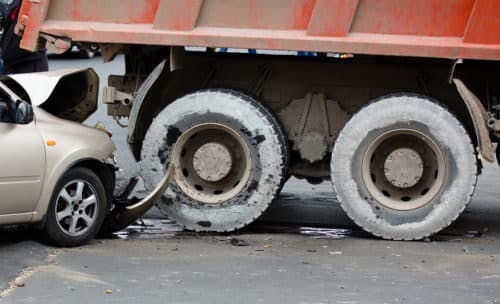
Semi-underride accidents are among the most devastating types of traffic collisions. These crashes involve a smaller vehicle sliding underneath the side of a semi-truck or trailer, often resulting in catastrophic consequences for the car occupants.
If you have been affected by a semi underride accident, either suffering a serious injury or losing a close family member, an attorney at Stewart J. Guss Injury Lawyers can analyze your situation and advise you on your rights and options. We can explain the law, investigate the cause of the accident, and seek fair compensation for you and your family.
What are Semi Underride Accidents and Why are They So Dangerous?
A semi underride accident is a type of truck crash that involves a smaller passenger vehicle becoming lodged underneath the trailer of a semi-truck. When this happens, the height difference between passenger cars and large commercial trucks exposes car occupants to extreme risks of head injuries, decapitation, and other fatal trauma. Reports indicate that underride crashes accounted for 400 fatalities in a recent year in the United States.
Also, the point of impact during these truck accidents is usually the windshield of a smaller passenger vehicle, which does not have safety features such as airbags. In fact, airbags may not even deploy during side underride collisions. This means that even at low speeds, semi underride accidents can cause life-altering or deadly injuries.
Underride Guards Can Fail
Although federal regulations do not mandate all semi-trucks and trailers to have side underride guards (only rear guards), they have developed underride protection standards to offer reasonable safety for passengers during crashes.
Underride guards on semi-trucks should stop a car from sliding underneath in case of a crash. A test for an underride guard found the device to significantly reduce the risk of underride crashes. The guard is affixed to the edges of a tractor-trailer, and a trial involving a mid-sized vehicle moving at 40 MPH demonstrated that the underride guard effectively stopped the car from slipping beneath the trailer.
However, these guards are not foolproof. While they can help absorb the impact of the crash, their effectiveness is significantly reduced when vehicles are moving at high speed or collisions happen at certain angles.
Additionally, the lack of enforcement leaves a gap in safety measures and contributes to the prevalence of semi underride collisions. While the law does not require underride guards, trucking companies might face civil liability for failing to use such guards if an underride occurs.
Causes of Semi Underride Accidents
There are several factors that may contribute to semi-truck side underride accidents. These include the following:
- Poor visibility due to inadequate lighting or lack of reflective materials on trucks, especially at night
- Sudden lane changes without warning other drivers
- Parking or stopping along the road without proper hazard signals
- Failing to check blind spots or adhere to traffic laws
- Aggressive driving and improper passing
Regardless of the cause of your semi underride accident, you are entitled to financial recovery for any injuries or losses from the negligent party. Your truck accident lawyer can help you analyze the situation to advise on the most appropriate course of action.
Holding Trucking Companies Liable
In many truck accident cases, trucking companies can be held liable for accidents. Companies are responsible for ensuring their vehicles meet safety standards, their drivers are adequately trained, and their fleets are well-maintained. When companies are negligent, they should cover resulting losses.
Further, the law holds trucking companies vicariously liable for the actions of truck drivers. This means the company itself does not have to engage in negligence for liability to apply.
A truck accident attorney can investigate whether the trucking company’s negligence contributed to the accident or whether other legal principles of liability apply. Having access to the trucking company’s corporate insurance coverage can increase your chances of full compensation for severe injuries and losses.
Wrongful Death Claims Following Fatal Truck Collisions
Semi underride crashes often result in fatalities due to the resulting catastrophic injuries. The loss of a loved one leaves surviving family members devastated and burdened with financial losses. If a loved one has been killed in such a collision, you may be entitled to file a wrongful death claim under Texas law. These claims seek to provide compensation for:
- Funeral and burial expenses
- Loss of financial support
- Loss of companionship and advice
- Loss of household services
- Emotional pain and suffering
- Loss of consortium
A successful wrongful death case provides grieving families with a sense of justice and financial support after losing a loved one. While money cannot erase the tragedy, financial resources can offer relief to the grieving family after the loss of a family member. Our attorneys will guide you through the process and ensure you secure your rightful wrongful death benefits.
Consult Our Truck Accident Attorneys Now
If you suffered injuries in a semi underride accident or tragically lost a family member, you have the legal right to seek compensation. Our truck accident attorneys can offer you compassionate representation and support in your journey to recovery.
Stewart J. Guss Injury Lawyers has been standing up for injured victims for over 25 years, and we can fight for your rights. Contact us today for a free consultation.
Back to BlogGet a Free Consultation
 2 minute response
2 minute response 24 hours a day, 7 Days a Week
24 hours a day, 7 Days a Week Dedicated Trust Guss Intake Team
Dedicated Trust Guss Intake Team
"*" indicates required fields

